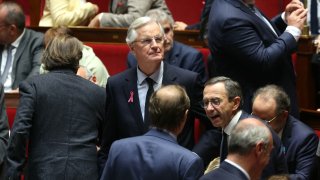
- French Prime Minister Michel Barnier on Monday opted to push through a contested budget bill without a vote in parliament.
- National Rally (RN) has failed to extract concessions from the conservative minority government, led by Michel Barnier, on the budget that involves 60 billion euros ($63 billion) worth of tax hikes and spending cuts.
- The far-right National Rally (RN) party, led by Marine Le Pen and Jordan Bardella, swiftly said it would lodge a no-confidence vote against Barnier in an attempt to oust him.

Watch NBC6 free wherever you are
>French Prime Minister Michel Barnier on Monday opted to push through a contested budget bill without a vote in parliament, a dramatic move that heightens the risk of the government being toppled by far-right and leftist rivals.
Barnier said he would invoke special constitutional powers to push through the bill, referring to article 49.3 of the French constitution, saying the country must have a budget for next year. The same article allows for opponents to trigger a confidence vote too, however.
Get local news you need to know to start your day with NBC 6's News Headlines newsletter.
>"We are at a moment of truth," Barnier told parliament, according to Reuters.
The far-right National Rally (RN) party, led by Marine Le Pen and Jordan Bardella, swiftly said it would lodge a no-confidence vote against Barnier in an attempt to oust him.
The RN had given the government a deadline of Monday to agree fresh concessions over the 2025 budget, which involves 60 billion euros ($63 billion) worth of tax hikes and spending cuts.
Money Report
The leftwing New Popular Front (NFP) alliance said Monday it will also table a no-confidence motion after Barnier triggered article 49.3.
On Sunday, Le Pen said the government had effectively "put an end to discussions" on the budget, according to French news agency Agence France-Presse, which reported that Barnier now faced a choice of negotiating new concessions or the threat that his government will fall in a confidence vote.

RN claimed the budget reduces the purchasing power of the French people and wants concessions on tax hikes that it says will affect households and businesses. Among its demands, the party is calling on Barnier to increase pensions in line with inflation in January and boost support for smaller businesses. The prime minister has already dropped a planned increase in electricity tax and on Monday, he ditched plans to reduce medication imbursements.
Early on Monday, RN President Bardella reiterated that the party would likely back a no-confidence motion against the government in the coming days unless there is a "last-minute miracle," in comments to RTL radio that were translated by Reuters.
If France's political turmoil comes to a head and Barnier's government is toppled, it's uncertain what could happen next. New parliamentary elections cannot be held until next June, 12 months after the last snap vote that was called by French President Emmanuel Macron in an ill-judged move aimed at achieving more political stability, but one that instead created far less.
Money markets are already nervous about France's unravelling political establishment and what that means for the euro zone's second-largest economy's needs to tackle its mounting debt pile and budget deficit, which is expected to stand at 6.1% in 2024. French public debt topped 110% of GDP in 2023.
Countries within the EU are obliged to keep their budget deficits within 3% of gross domestic product and their public debt within 60% of GDP. Even before those EU rules came into force, France was a long-time offender in failing to control its public spending, with no government balancing the budget since 1974.
France's brewing crisis spilled into financial markets last week with the country's borrowing costs hitting the same level as debt-ridden Greece's for the first time on record last Thursday.
Taken as a whole, France is on the "wrong track," economists at Berenberg Bank led by Holger Schmieding, said in analysis Monday, warning that "France urgently needs to correct its unsustainable fiscal policy," while noting that the Barnier government was now "at the mercy of National Rally."
Nonetheless, they noted in emailed comments that Le Pen had to play a carefully calculated political game in the coming days.
"Le Pen may want to present herself as the guardian of ordinary people by opposing some of Barnier's tax hikes and spending cuts. But doing so would also be risky for her," they said.
"If she now causes a financial crisis with a spike in bond yields and possibly a French recession, she could be seen as an agent of chaos rather than a responsible leader." That, in turn, could damage her chances of winning the presidency in 2027, they noted.
"This calculus suggests that Le Pen may still try to find a compromise with Barnier, sparing France a political and financial crisis this Christmas," they noted.
Trouble, whatever happens?
Even if the 2025 budget passed by some "last-minute miracle," to borrow Bardella's phrase, economists noted that it would be a short-lived reprieve from France's wider fiscal challenges.
"If the new and still very much minority government reaches agreement with National Rally and passes the 2025 budget, then it will produce some relief in markets ... However, this would not fix France's huge budget deficit and government debt problems that requires years of substantive fiscal tightening to get a primary surplus," Mike Gallagher, director of macroeconomics and strategy at Continuum Economics said in a note early Monday.
"With the end of ultra-low interest rates, France's debt servicing costs are projected by the ECB to rise above 4% by 2034, which would cause a major and persistent debt crisis. However, further multi-year fiscal tightening is unlikely before the next parliamentary election from July 2025 and perhaps the presidential election in 2027. France needs a high-risk premium to reflect political problems; insufficient momentum on fiscal consolidation and the risk that non-resident reduce their huge holdings (53% of outstanding debt)," he noted in emailed comments.

If the budget fails to pass, Gallager said, Europe's financial markets would see heightened volatility.
He warned that the spread — the difference in yield between French and German bonds could mushroom from its current level of around 80 basis points to 150 basis points, and that the European Central Bank would be potentially forced to act, in some shape or form, to calm markets.
Berenberg Bank agreed that if French turmoil were to cloud the outlook for euro zone growth significantly, the ECB might have to adjust its overall monetary stance by cutting rates more than otherwise planned.
"However, we consider it highly unlikely that the ECB would step in directly to support France with bond purchases ... The ECB would have no business to spare France the potential consequences of failing to pass a budget. France would have to get its act together on its own, possibly by the centre-left and/or Le Pen rethinking their opposition to the necessary fiscal consolidation," Berenberg's economists said.






